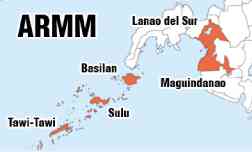Political dynasties threaten Bangsamoro success — Ateneo dean
Banning political dynasties in the proposed Bangsamoro autonomous region would give it a “fighting chance” to grow alternative leaders and strengthen their political parties, the dean of Ateneo School of Government stressed on Thursday.
Dr. Ronald Mendoza’s statement comes after Senate Minority Leader Franklin Drilon asked if he should continue to push for an anti-political dynasty provision in the Bangsamoro Basic Law (BBL), which seeks to replace the existing Autonomous Region in Muslim Mindanao (ARMM).
READ: Drilon pushes for provision prohibiting political dynasties in BBL
Mendoza supported Drilon’s move citing that the “average effect of political clan leadership” in the country was “pervasive poverty.”
“Senator (Juan Miguel) Zubiri earlier said that if you implement an anti-dynasty provision in the BBL, mauubos po ang pinuno ng ARMM. In one way totoo po ito, dahil ang dami po nilang magkakamag-anak na namumuno,” Mendoza said during the Senate joint committee hearing on anti-dynasty bills.
Article continues after this advertisement“We cannot expect ARMM to develop good governance and strong political parties when it’s starting point is already captured. We must give it a fighting chance to grow alternative leaders and strengthen political parties,” he added.
Article continues after this advertisementIn other words, he said, the Bangsamoro people could “never have strong political parties, and therefore ARMM or Bangsamoro will fail” if “we will not give them a fighting chance to do it properly” by regulating political dynasties in the region.
This, he said, is because the Bangsamoro people “can no longer speak up, can no longer challenge their leaders, because they have long been captured” by the system of traditional politicians.
Mendoza said the proposed measure, however, should not be called an “anti-political dynasty law,” but a “dynasty-regulation law.”
“We are not banning any Filipino from leading, just like a stop light, we’re just arranging the way we pick our leaders so that more people get a chance,” he said.
“Kung ayusin po natin stop light, we will actually have a more inclusive democracy with a dynasty-regulation law… We are not against Filipinos serving the country, we are for more Filipinos serving the country,” he added.
Earlier, Mendoza cited that based on the Family Income and Expenditure Survey conducted by the Philippine Statistics Authority in 2016, three of ARMM’s provinces had remained in the top five poorest provinces in the country.
Lanao del Sur was the poorest with 74.2 percent poverty incidence, followed by Sulu (65.7 percent), Sarangani (61.7 percent), Northern Samar (61.6 percent), and Maguindanao (59.4 percent). /cbb
